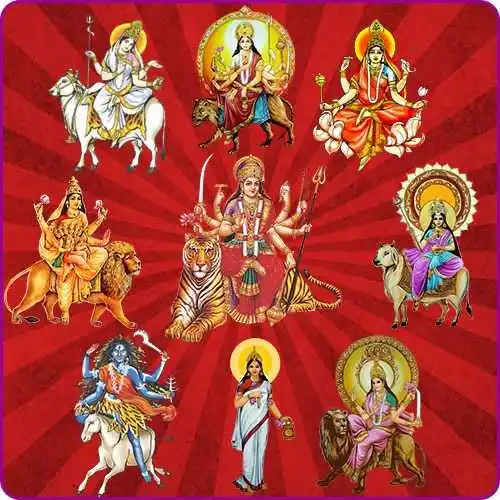Navratri, one of the most vibrant and spiritual Hindu festivals, honors a different aspect of the Goddess Durga each day, dedicating themselves to the nine divine forms of the goddess. The festival not only represents dance, music, and vibrant costumes but also extends nine days with daily rituals and prayers, uniquely representing a quality and story for each day. This article delves into the importance of each day of Navratri, deepening your understanding of this sacred celebration.
![navdurga navdurga]()
Day 1: Shailputri – The Daughter of the Mountains
The first day is dedicated to the goddess Shailputri, also known as the Daughter of the Mountains. She is an incarnation of Mother Earth and symbolizes the energy source for all beings. Devotees worship Shailputri on this day to seek her divine blessings, offering prayers for health, wealth, and prosperity.
Day 2: Brahmacharini – The Ascetic Goddess
On the second day, devotees venerate Brahmacharini, an embodiment of purity and divinity. With her unwavering focus and spiritual dedication, she represents the journey towards enlightenment, engaging in deep contemplation and meditation. Devotees offer prayers and seek her blessings on this day for strength and humility.
Day 3: Chandraghanta – The Warrior Goddess
The third day of Navratri sees the worship of Chandraghanta, a fearless and fierce divine warrior. She symbolizes bravery, grace, and beauty, battling against evil and ensuring peace and security for her followers. Devotees invoke her blessings to conquer their fears and to progress on their spiritual path, adhering to a righteous and honorable life.
Day 4: Kushmanda – The Creator of the Universe
On the fourth day, the Creator Goddess Kushmanda is honored. She is believed to have created the Universe with the sheer power of her divine smile. Kushmanda is associated with prosperity, abundance, and the light of wisdom. Prayers are offered to her, seeking clarity and understanding in life and the guidance to make the right choices.
Day 5: Skandamata – The Mother of Lord Skanda
Skandamata, the mother of Lord Skanda or Kartikeya, is venerated on the fifth day of Navratri. She symbolizes the unconditional love, compassion, and wisdom of the divine mother. Her motherly nurturing is sought to empower devotees in their quest for knowledge and truth, helping them to remain focused on their spiritual journey.
Day 6: Katyayani – The Warrior Aspect of the Goddess
The sixth day of Navratri is dedicated to the worship of goddess Katyayani, who is both benevolent and fierce. She embodies courage and strength, fighting against darkness and injustice. Devotees seek her protection from evil and negative influences and ask for her blessings to face challenges with resilience and determination.
Day 7: Kalaratri – The Goddess of Darkness and Destruction
Kalaratri, the Goddess of Darkness and Destruction, is revered on the seventh day of Navratri. She is the personification of chaos and ultimate balance, ensuring the proper functioning of the cosmos. Through her divine power, she destroys the ignorance of devotees, helping them to attain spiritual enlightenment. Prayers are offered to her for strength, wisdom, and inner transformation.
Day 8: Mahagauri – The Goddess of Purity and Compassion
On the penultimate day of Navratri, goddess Mahagauri is worshipped. She symbolizes purity, kindness, and compassion, helping her followers to cleanse their minds and souls from impurities and negativity. Devotees pray to her for liberation from material desires and the pursuit of divine knowledge, opening themselves to spiritual growth and rebirth.
Day 9: Siddhidhatri - The Bestower of Supernatural Powers
The last day of Navratri is devoted to Siddhidhatri, the goddess of supernatural powers, blessings, and wisdom. She is said to grant seekers mystical abilities and spiritual insight, aiding them on their inner journeys. On this day, devotees seek her divine grace to attain the pinnacle of spiritual fulfillment and gain access to the ultimate truth.
In conclusion, each day of Navratri carries profound significance and offers an opportunity for devotees to explore and honor different facets of the Goddess Durga. By understanding and engaging in these divine aspects, one can achieve personal and spiritual growth, deepening their connection to the sacred feminine energy that pervades the cosmos.
![birthday occasion]() Birthday Gifts
Birthday Gifts
![anniversary occasion]() Anniversary Gifts
Anniversary Gifts
![women]() Women
Women
![men]() Men
Men
![Couples]() Couples
Couples
![Couples]() Wedding Gifts
Wedding Gifts

 Birthday Gifts
Birthday Gifts
 Women
Women
 Men
Men
 Anniversary Gifts
Anniversary Gifts
 Wedding Gifts
Wedding Gifts

 We now support international payments
We now support international payments
